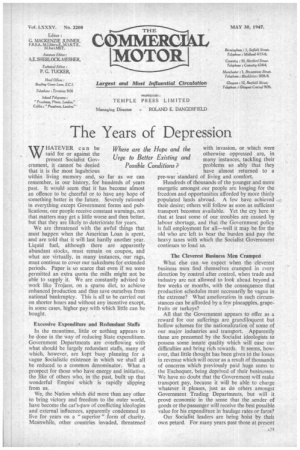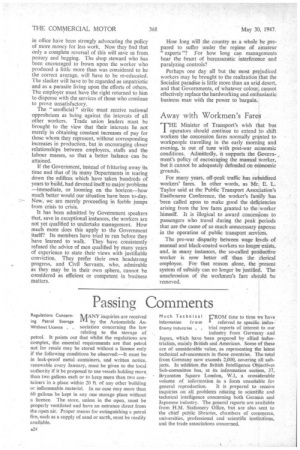The Years of Depression
Page 25

Page 26

If you've noticed an error in this article please click here to report it so we can fix it.
WHATEVER can be said for or against the present Socialist Government, it cannot be denied that it is the most lugubrious within living memory and, so far as we can remember, in our history, for hundreds of years past. It would seem that it has become almost an offence to be cheerful or to have any hope of something better in the future. Severely rationed in everything except Government forms and publications, our people receive constant warnings, not that matters may get a little worse and then better, but that they are likely to deteriorate for years.
We are threatened with the awful things that must happen when the American Loan is spent, and are told that it will last hardly another year. Liquid fuel, although there are apparently abundant stocks, must remain on coupon, and what are virtually, in many instances, our rags, must continue to cover our nakedness for extended periods. Paper is so scarce that even if we were permitted an extra quota the mills might not be able to supply it. We are constantly advised to work like Trojans, on a sparse diet, to achieve enhanced inoduction and thus save ourselves from national bankruptcy. This is all to be carried out on shorter hours and without any incentive except, in some cases, higher pay with which little can be bought.
Excessive Expenditure and Redundant Staffs In the meantime, little or nothing appears to be done in the way of reducing State expenditure. Government Departments are overflowing with what should be largely redundant staffs, many of which, however, are kept busy planning for a vague Socialistic existence in which we shall all be reduced to a common denominator. What a prospect for those who have energy and initiative, the like of others who, in the past, built up that wonderful Empire which is rapidly slipping from us.
We, the Nation which did more than any other to bring victory and freedom to the outer world, have become the cat's-paw of conflicting ideologies and external influences, apparently condemned to live for years on a " superior " form of charity. Meanwhile, other countries invaded, threatened with invasion, or which were otherwise oppressed are, in many instances, tackling their problems so ably that they have almost returned to a pre-war standard of living and comfort.
Hundreds of thousands of the younger and more energetic amongst our people are longing for the freedom and opportunities afforded by more thinly populated lands abroad. A few have achieved their desire; others will follow as soon as sufficient transport becomes available. Yet the cry here is that at least some of our troubles are caused by labour shortage, and that the Government policy is full employment for all—well it may be for the old who are left to bear the burden and pay the heavy taxes with which the Socialist Government continues to load us.
The Cleverest Business Men Cramped What else can we expect when the cleverest business men find themselves cramped in every direction by control after control, when tradb and industry are not allowed to look ahead beyond a few weeks or months, with the consequence that production schedules must necessarily be vague in the extreme? What amelioration in such circuim, stances can be afforded by a few pineapples, grapefruits or turkeys?
All that the Government appears to offer as a reward for our sufferings are grandiloquent but hollow schemes for the nationalization of some of our major industries and transport. Apparently these are presumed by the Socialist ideologists to possess some innate quality which will ease our difficulties and bring rich rewards. It seems, however, that little thought has been given to the losses in revenue which will occur as a result of thousands of concerns which previously paid huge sums to the Exchequer, being deprived of their businesses. We have no doubt that the Government will make transport pay, because it will be able to charge whatever it pleases, just as do others amongst Government Trading Departments, but will it prove economic in the sense that the sender of goods or the passenger will receive the best possible value for his expenditure in haulage rates or fares?
Our Socialist leaders are being hoist by theft own petard. For many years past those at present in office have been strongly advocating the policy of more money for less work. Now they find that only a complete reversal of this will save us from penury and begging. The shop steward who has been encouraged to frown upon the worker who produced a little more than was considered to be the correct average, will have to be re-educated. The slacker will have to be regarded as unpatriotic and as a parasite living upon the efforts of others. The employer must have the right returned to him to dispense with the services of those who continue to prove unsatisfactory.
The " unofficial" strike must receive national opprobrium as being against the interests of all other workers. Trade union leaders must be brought to the view that their interests lie not merely in obtaining constant increases of pay for those whom they represent, without corresponding increases in production, but in encouraging closer relationships between employers, staffs and the labour masses, so that a better balance can be attained.
If the Government, instead of frittering away its time and that of its many Departments in tearing down the edifices which have taken hundreds of years to build, had devoted itself to major problems —immediate, or looming on the horizon—how much better would our situation have been to-day. Now, we are merely proceeding in feeble jumps from crisis to crisis.
It has been admitted by Government speakers that, save in exceptional instances, the workers are not yet qualified to undertake management. How much more does this apply to the Government itself? Its members have tried to run before they have learned to walk. They have consistently refused the advice of men qualified by many years of experience to state their views with justifiable conviction. They prefer their own headstrong progress, and Civil Servants, who, admirable as they may be in their own sphere, cannot be considered as efficient or competent in business matters. How long will the country as a whole be prepared to suffer under the regime of amateur "experts "? For how long can managements bear the brunt of bureaucratic interference and paralyzing controls?
Perhaps one day all but the most prejudiced workers may be brought to the realization that the Socialist paradise is little more than an arid desert, and that Governments, of whatever colour, cannot effectively replace the hardworking and enthusiastic business man with the power to bargain.
Away with Workmen's Fares
THE Minister of Transport's wish that bus operators should continue to extend to shift workers the concession fares normally granted to workpeople travelling in the early morning and evening, is out of tune with post-war economic conditions. Admittedly, it supports the Government's policy of encouraging the manual worker, but it cannot be adequately defended on economic grounds.
For many years, off-peak traffic has subsidized workers' fares. In other words, as Mr. E. L. Taylor said at the Public Transport Association's Eastbourne Conference, the worker's funny has been called upon to make good the deficiencies arising from the low fares granted to the worker himself. It is illogical to award concessions to passengers who travel during the peak periods that are the cause of so much unnecessary expense in the operation of public transport services.
The pre-war disparity between wage levels of manual and black-coated workers no longer exists, and, in many instances, the so-called productive worker is now better off than the clerical employee. For that reason alone, the present system of stibsidy can no longer be justified. The anachronism of the workmen's fare should be removed.












































































